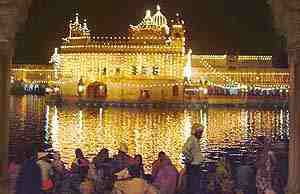Sikhs take holy dip in Amritsar to kick off Diwali celebrations

ANI By
Ravinder Singh Robin/Devraj, Amritsar(Punjab)/Margao (Goa): Sikhs in the holy city of Amritsar took a dip in the holy pond of famous Golden Temple on Tuesday to kick off Diwali festivities, a ritual dating back to 17th century to mark the release of persecuted Sikhs. It was on this day, that the Sixth Sikh Guru, Guru Hargovind, secured the release of 56 kings imprisoned at the Gwalior Fort from Mughal Emperor Jehangir and returned with them to Amritsar to a warm welcome.
It was also on this day in 1577, that the foundation stone of the Golden Temple, the Sikh's most revered shrine, was laid. Since then, millions of Sikhs pay their obeisance at the shrine on this day. “We celebrate Diwali by lighting candles to mark the return of our Guru in Gwalior Fort who also rescued other Sikhs from the custody,” said Surjeet Singh, a devotee.
Many Hindus also joined Sikhs in celebrating the festivities. Meanwhile, Hindus in Goa kicked off their Diwali celebrations by taking out huge effigies of demon king Narakasur, who was killed by Lord Krishna. Huge effigies of Narakasur attired in colourful paper clothes and armed with swords and other armaments dotted the Goan landscape, in the days leading upto the festival of Diwali, only to be burnt before sunrise on Tuesday.
In Goa, Diwali begins with the burning of Narakasur (to mark end of evil) Hindus followed by lighting of lamps to welcome the dawn. Thousands of people gathered on the city streets to witness the re-enactment of the epic story of the slaying of demon Narakasur by Lord Krishna. Baba Naik, Organising Member, Margao Narakasur Festival, said “The main purpose of to give entertainment to people and also to bring people together on the cultural platform.” In Assam, the festival takes on a different hue.
There, it is celebrated to commemorate the liberation of some 16,000 maidens kept hostage by the tyrant king of Kamrup (Narkasur) in his harem, by Lord Krishna. Diwali symbolises the victory of righteousness over evil and the lifting of spiritual darkness. This festive occasion also marks the beginning of the Hindu New Year. Lord Ganesha is also worshipped in most Hindu homes on this day.

0 Comments:
Post a Comment
<< Home